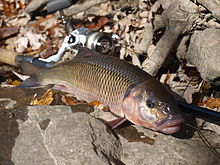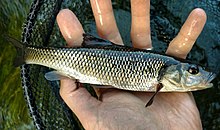| Fallfish | |
|---|---|

| |
| Conservation status | |
 Least Concern (IUCN 3.1) | |
| Scientific classification | |
| Domain: | Eukaryota |
| Kingdom: | Animalia |
| Phylum: | Chordata |
| Class: | Actinopterygii |
| Order: | Cypriniformes |
| Family: | Cyprinidae |
| Subfamily: | Leuciscinae |
| Genus: | Semotilus |
| Species: | S. corporalis |
| Binomial name | |
| Semotilus corporalis (Mitchill, 1817) | |
| Synonyms | |
| |
The fallfish (Semotilus corporalis) is a North American freshwater fish, a chub in the family Cyprinidae. The fallfish is the largest minnow species native to Eastern North America.
Description
Average specimens generally measure about 5 in (13 cm) in length, but individuals occasionally grow to 15 in (38 cm) with exceptional specimens of more than 19 in (48 cm) having been recorded. Juvenile fallfish have a dark stripe that runs down the center of their body. They are a silvery shade on the top and sides of the body, but have a white shading on the belly. Breeding males develop a pinkish tone on the opercular region, although the species does not develop bright breeding colors. Spawning males build stone nests, known as a redd, which form a prominent part of the bottom on many streams throughout the northeast. Spawning is communal with both males and females joining the nest builder.
Distribution and habitat
Fallfish are found in the northeastern United States and eastern Canada, where they inhabit clear streams, lakes, and ponds. They predominantly prefer swift currents, however, they can also be found in well oxygenated pools. As their name suggests they are often found at the base of waterfalls. Before the introduction of fish such as smallmouth bass, largemouth bass, and brown trout, the fallfish was the apex predator in many streams.
Diet and predation
Juvenile and young fallfish primarily consume chironomids and zooplankton. Once they reach 100mm their diet transitions to small fish (including their own young) and prey of opportunity such as fish eggs and terrestrial insects. There is little overlap between the diets of juvenile and adult fallfish.
Angling
Fallfish are often encountered when fishing for more desirable species, but their large size, dogged fighting style, powerful runs on light tackle, and willingness to strike make them a worthy quarry in their own right. They will readily take bait, lures, and flies, and have been known to strike lures almost as large as themselves.
The International Game Fish Association (IGFA) All Tackle World Record for fallfish is 3 pounds 9 ounces (1.6 kg), caught by Jonathan McNamara in the Susquehanna River near Owego, New York, USA on April 15, 2009. The record was tied on May 6, 2022, by angler Josh D. Dolin while fishing the Cowpasture River near Williamsville, Virginia. Previous records come from New Hampshire and Pennsylvania.
Thoreau said of its eating qualities: "it tastes of brown paper, salted."



References
- NatureServe (2013). "Semotilus corporalis". IUCN Red List of Threatened Species. 2013: e.T202371A18231202. doi:10.2305/IUCN.UK.2013-1.RLTS.T202371A18231202.en. Retrieved 19 November 2021.
- Curry, Allen; Gautreau, Mark; Yamazaki, Gordon. "Fallfish, Semotilus corporalis". Inland Fishes of New Brunswick. University of New Brunswick. Retrieved 2 December 2022.
- Kirk, Molly (15 April 2021). "Jerry Hall Takes Over as Fallfish State Record Holder". Notes from the Field Blog. Virginia Department of Wildlife Resources. Retrieved 2 December 2022.
- "Fallfish". state.nh.us. New Hampshire Fish and Game. Retrieved 2 December 2022.
- Pinder, Mike (27 September 2016). "Fallfish: Little Tarpon of the Commonwealth". Notes from the Field Blog. Virginia Department of Wildlife Resources. Retrieved 2 December 2022.
- Johnson, James H.; Nack, Christopher C.; Chalupnicki, Marc A. (2009). "Predation by Fallfish (Semotilus corporalis) on Pacific Salmon Eggs in the Salmon River, New York". Journal of Great Lakes Research. 35 (4): 630–633. Bibcode:2009JGLR...35..630J. doi:10.1016/j.jglr.2009.08.001. S2CID 84818688.
- "Fallfish (Semotilus corporalis)". IGFA.com. International Game Fish Association. Retrieved 2 December 2022.
External links
- Smith, L. C. The Inland Fishes of New York State. New York: The New York State Department of Environmental Conservation. 1985, pp. 155, 156
- Froese, Rainer; Pauly, Daniel (eds.). "Semotilus corporalis". FishBase. Apr 2007 version.
| Taxon identifiers | |
|---|---|
| Semotilus corporalis | |
This Leuciscidae article is a stub. You can help Misplaced Pages by expanding it. |
This fishing-related article is a stub. You can help Misplaced Pages by expanding it. |